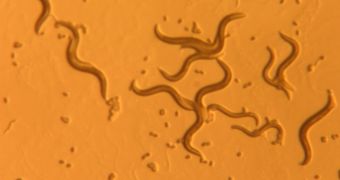A team of researchers working with Duke University in the United States have uncovered evidence that the long sought-after fountain of youth might not be some magical spring hidden in some remote part of the globe, but something well within reach: starvation.
In a paper published in the journal PLOS Genetics this past June 19, the scientists explain that, according to their investigations into the matter at hand, a very strict diet, i.e. eating nothing at all, has the potential to prolong life.
Thus, the researchers say that, while carrying out a series of experiments on nematode worms C. elegans, they found that, when these creatures were left without any food, their cells and organs entered a so-called quiescent state.
Simply put, the lack of food caused the worms' cells to become inactive and dormant. As detailed on the official website for Duke University, this quiescent state translated into the worms' no longer developing and growing.
Despite the fact that the worms' cells and organs were in time-out, the creatures continued to move about their designated habitats. Besides, the researchers say that, when introduced to food, the worms picked up where they left off growth-wise.
What's interesting is that, in the aftermath of this stand-by in growth and development brought about by starvation, the worms lived twice as long as they would have, had they not been made to fast. Simply put, starvation was found to have doubled their life expectancy.
Since many people would much rather put on their Indiana Jones or Lara Croft costumes and go in search of an actual fountain of youth than stay clear of cakes, hamburgers and the like for more than two days in a row, researchers are now looking to develop anti-aging treatments based on these findings.
Specifically, the Duke University specialists envision a treatment that would trigger the effects that starvation had on worms without the need for steak and ice cream enthusiasts to say goodbye to their favorite foods for the sake of longevity.
“It is possible that low-nutrient diets set off the same pathways in us to put our cells in a quiescent state. The trick is to find a way to pharmacologically manipulate this process so that we can get the anti-aging benefits without the pain of diet restriction,” says researcher David R. Sherwood.
Interestingly enough, the discovery that starvation can put worms into a quiescent state is expected to also lead to a better understanding of cancer. “This study has implications not only for aging, but also for cancer,” David R. Sherwood explains.
“One of the biggest mysteries in cancer is how cancer cells metastasize early and then lie dormant for years before reawakening. My guess is that the pathways in worms that are arresting these cells and waking them up again are going to be the same pathways that are in human cancer metastases,” he adds.

 14 DAY TRIAL //
14 DAY TRIAL //